Pre-school Maths
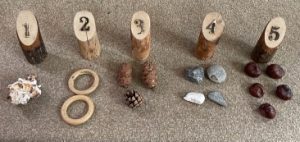
Mathematical development is complex. Developing a secure grasp of early mathematical ideas takes time. Even if a child appears to be engaging successfully in mathematical activities, such as reciting the count sequence, they may not understand the meaning of the numbers they are saying. It is important that practitioners are aware of typical development of mathematical skills and concepts and have the knowledge to support children’s understanding.
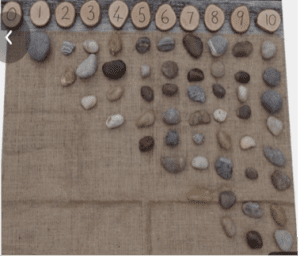 We at Inspirations have observed how beneficial the use of loose parts is for maths development. When children transform objects in their creative play, they are unknowingly problem-solving and building their imaginations. For example, when sticks and stones become food, mathematical concepts are natural encouraged as they assess the shapes, sizes and amounts they need. Often children will simply use loose parts to line up, order in size, number and make patterns.
We at Inspirations have observed how beneficial the use of loose parts is for maths development. When children transform objects in their creative play, they are unknowingly problem-solving and building their imaginations. For example, when sticks and stones become food, mathematical concepts are natural encouraged as they assess the shapes, sizes and amounts they need. Often children will simply use loose parts to line up, order in size, number and make patterns.
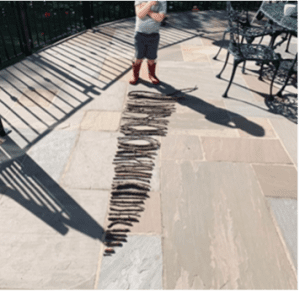 Pattern is extremely important for maths development. Recognising number through pattern and subitising (instantly recognising without counting) are skills we can help to develop by using a wide range of ideas and resources. Children will quickly recognise what the patterns on dice represent as numbers and progress to adding two sets of number patterns through board games and play.
Pattern is extremely important for maths development. Recognising number through pattern and subitising (instantly recognising without counting) are skills we can help to develop by using a wide range of ideas and resources. Children will quickly recognise what the patterns on dice represent as numbers and progress to adding two sets of number patterns through board games and play.
Dots seen in a regular pattern representing numbers has been used to support addition and subtraction in schools for many years.
. . .
. . = 7 . . = 3
. .
.
Eventually children become familiar with each number representation as they see these same patterns while recognising the shapes they make.
Numicon uses familiar shapes to represent numbers. Exploration of these resources at a young age will familiarise a child with their shapes and colours and eventually numbers will be assigned to each shape. As the shapes are 1-10 they can be used for ‘number bonds to ten’ by fitting the shapes together to form the 10th shape. They can also be used to support ‘adding beyond 10’ or ordering them as numbers and matching the numerals.
![]()
Conceptualising number through pattern can be supported in many other ways such as playing dominoes, using dice in a board game, playing cards or using tens frames.
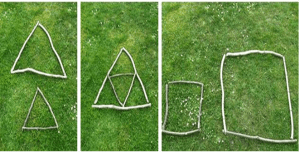 Challenges and activities to support maths progression can be planned regularly with adult support. Practitioners can work with children, sensitively intervening with questioning and prompts. Metacognition is the ability to reflect on your own thinking processes. Practitioners should encourage children to explain their thinking and strategies when solving mathematical problems. This enables children to gain an insight into their own thinking, learn from their mistakes, and develop problem-solving skills. Questions such as, ‘How did you…?’, ‘Why does this…?’, encourages children to reflect more deeply and to put their thought processes into words. Our practitioners seize chances to reinforce mathematical vocabulary in everyday situations. For example, by commenting on which child is standing ‘first’, ‘second’, or ‘last’ in line, which child has ‘more than’ or ‘fewer’ objects than another child and how many steps it takes to climb the stairs. The introduction of more refined mathematical vocabulary is then slowly increased through focused activities.
Challenges and activities to support maths progression can be planned regularly with adult support. Practitioners can work with children, sensitively intervening with questioning and prompts. Metacognition is the ability to reflect on your own thinking processes. Practitioners should encourage children to explain their thinking and strategies when solving mathematical problems. This enables children to gain an insight into their own thinking, learn from their mistakes, and develop problem-solving skills. Questions such as, ‘How did you…?’, ‘Why does this…?’, encourages children to reflect more deeply and to put their thought processes into words. Our practitioners seize chances to reinforce mathematical vocabulary in everyday situations. For example, by commenting on which child is standing ‘first’, ‘second’, or ‘last’ in line, which child has ‘more than’ or ‘fewer’ objects than another child and how many steps it takes to climb the stairs. The introduction of more refined mathematical vocabulary is then slowly increased through focused activities.
 Physical whole-body movement and gestures support the learning of mathematics, for example, moving along a physical number line or jumping and clapping while counting. Practitioners should also encourage children’s use of fingers which are important manipulatives, initially useful for supporting counting and later for counting in groups.
Physical whole-body movement and gestures support the learning of mathematics, for example, moving along a physical number line or jumping and clapping while counting. Practitioners should also encourage children’s use of fingers which are important manipulatives, initially useful for supporting counting and later for counting in groups.
It is important to realise that not all maths activities need specific or specialised resources, anything can be counted and numbers can be formed with most materials. During Covid lockdown, Inspirations provided a virtual nursery and the first activity we suggested was to go for a walk and collect natural resources. These were then used in our future activities to ensure that all children could take part without having to purchase anything.
Maths opportunities are all around us. We should encourage learning in this area through numerical songs, games, activities and play, to help children develop a keen attitude for maths, so they can follow this interest when it becomes a lot trickier in formal school!
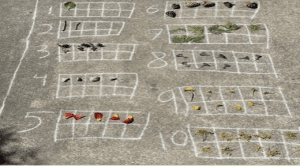
Deborah Keane